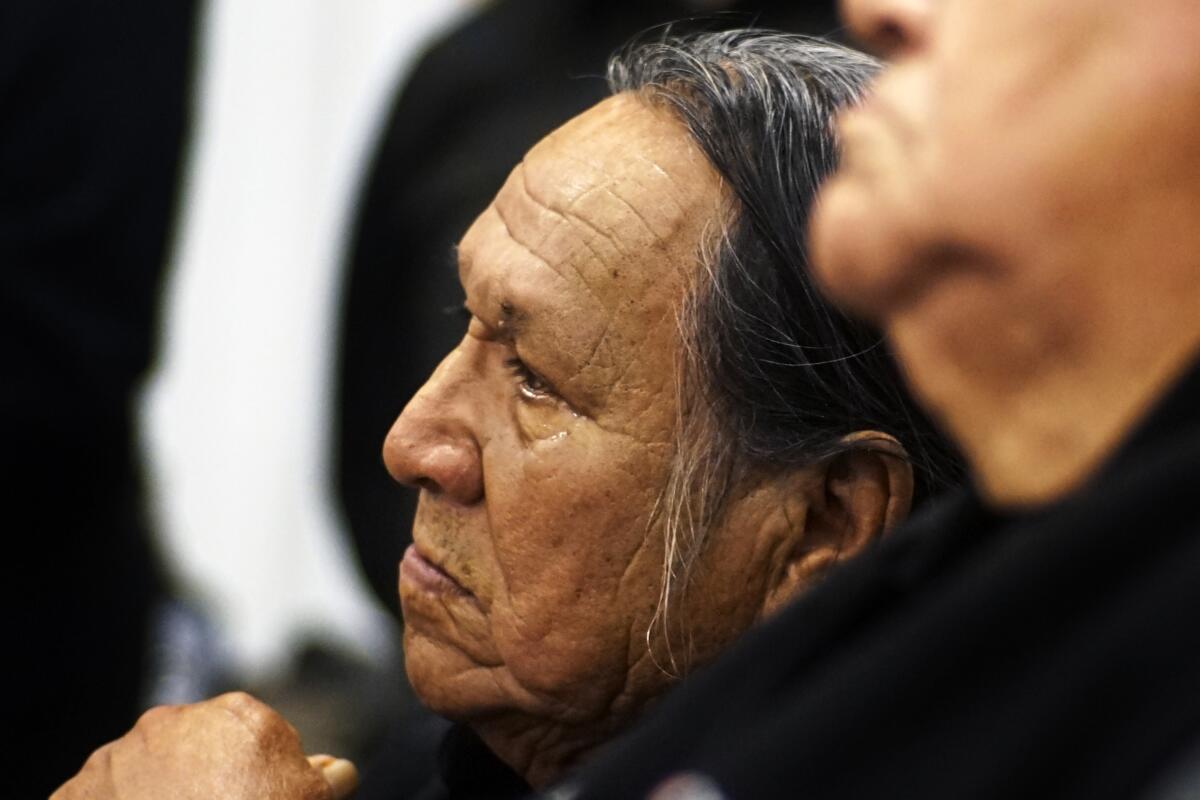Leonard Crow Dog, Native American activist who helped lead Wounded Knee occupation, dies

- Share via
Chief Leonard Crow Dog, a renowned spiritual leader and Native American rights activist who fought for sovereignty, language preservation and religious freedom and who helped lead the 71-day Wounded Knee occupation, has died at 78.
Crow Dog died June 6 at Crow Dog’s Paradise on the Rosebud Indian Reservation in South Dakota after a battle with cancer, Indian Country Today reported.
As a youth, Crow Dog learned about cultural traditions and ceremonies from his father and Lakota elders. He later became a spiritual leader for the American Indian Movement.
“He did not go to school. Instead, his parents enlisted four medicine men to guide his education,” Rosebud Sioux Tribe President Rodney Bordeaux said in a statement. “Throughout his life, Crow Dog learned from the University of the Universe, as he would say, and he shared his understanding of WoLakota with our Sicangu Oyate, the Oceti Sakowin, and Peoples of all Nations.”
Crow Dog attended and spoke at countless rallies, marches and protests over the years. He also co-wrote a book, “Crow Dog: Four Generations of Sioux Medicine Men,” which tells the story of his ancestors and his life.
In 1972, Crow Dog took part in the Trail of Broken Treaties, which included the occupation of the Bureau of Indian Affairs’ headquarters in Washington.
He also participated in and was arrested after the occupation at Wounded Knee on the Pine Ridge Reservation, a seminal moment in the Native American rights movement that brought about a deeper understanding of the mistreatment of tribal members across the country.
He was incarcerated for two years, then returned home to hold sweat lodge and peyote ceremonies, sun dances and other spiritual activities. He revived Lakota traditions, including the Ghost Dance, and counseled many people during times of loss or hardship.
Crow Dog also lobbied for the American Indian Religious Freedom Act and Indian Self Determination Act, two laws that altered the relationship between Native Americans and the U.S. government.
In 2016, he joined and held ceremonies with Native Americans from across the country who gathered near the Standing Rock Indian Reservation in the Dakotas to protest the Dakota Access pipeline, which would have skirted tribal lands.
Native American protests of an oil pipeline under construction in North Dakota began this spring with a handful of people praying in a makeshift camp on a nearby Indian reservation.
“Crow Dog gave his life for the people through ceremony, songs, Sundance, political action and bold leadership,” said Nick Tilsen, a member of the Oglala Lakota Nation and president and chief executive of NDN Collective, an Indigenous-led advocacy organization.
“This is a loss that hurts us all deeply,” Tilsen said. “His legacy will be carried forward with what we all do with the things he taught us through his love for the people.”
The Rosebud Sioux Tribe flew flags at half-staff in Crow Dog’s honor.
More to Read
Start your day right
Sign up for Essential California for the L.A. Times biggest news, features and recommendations in your inbox six days a week.
You may occasionally receive promotional content from the Los Angeles Times.






